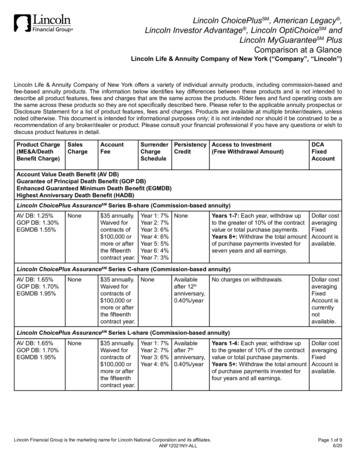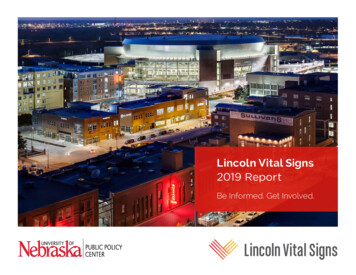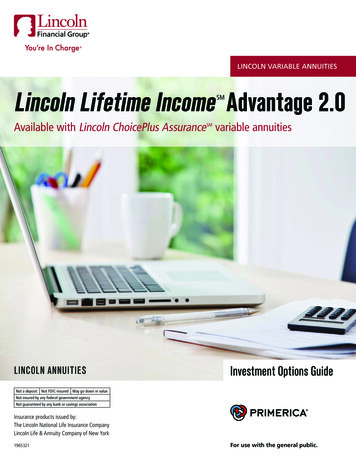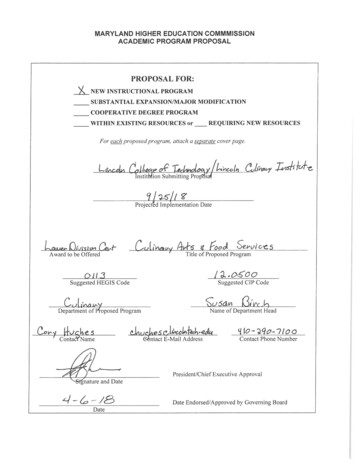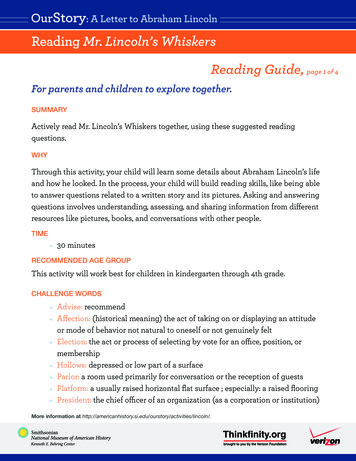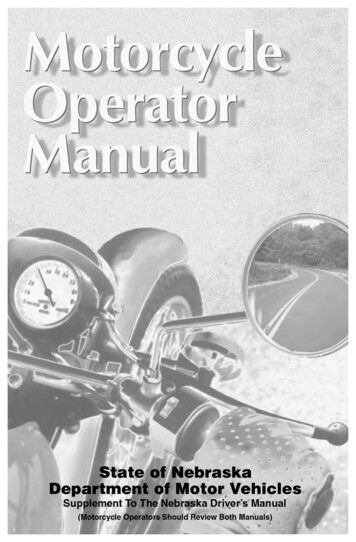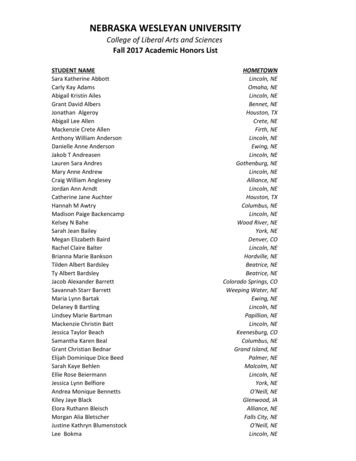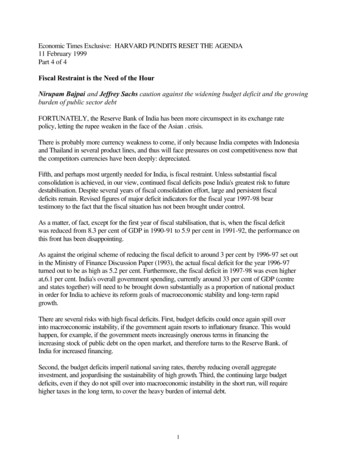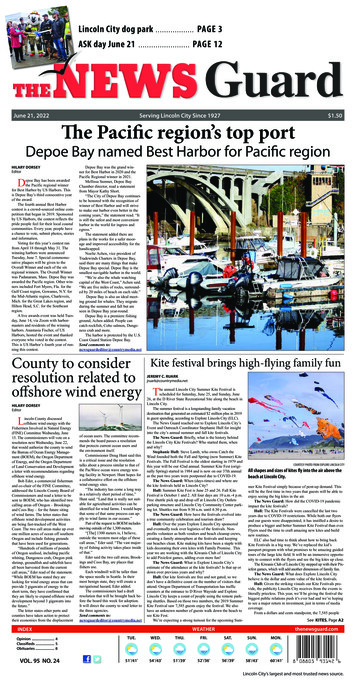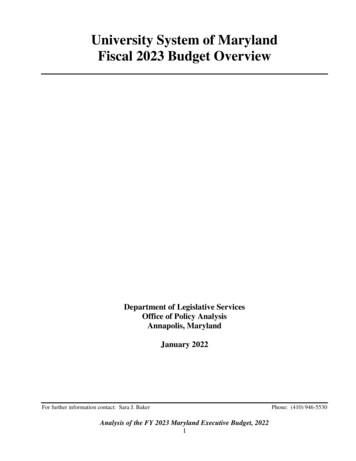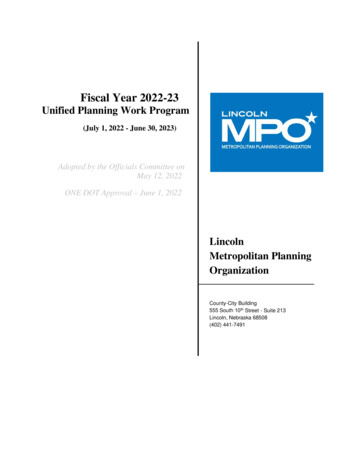
Transcription
Fiscal Year 2022-23Unified Planning Work Program(July 1, 2022 - June 30, 2023)Adopted by the Officials Committee onMay 12, 2022ONE DOT Approval – June 1, 2022LincolnMetropolitan PlanningOrganizationCounty-City Building555 South 10th Street - Suite 213Lincoln, Nebraska 68508(402) 441-7491
UNIFIED PLANNING WORK PROGRAM(PL-059-60)Lincoln Metropolitan Planning OrganizationFiscal Year 2022-23(July 1, 2022 - June 30, 2023)Submitted byLincoln-Lancaster Planning Departmentfor the Lincoln Metropolitan Planning Organization555 South 10th StreetLincoln, Nebraska 68508Technical Committee ApprovalApril 14, 2022Officials Committee ApprovalMay 12, 2022Metropolitan Planning Organization EndorsementMay 12, 2022FHWA/FTA ApprovalJune 1,2022March 2022
Required Credit / Disclaimer Statement“The preparation of the document was financed in part withfunding from the United States Department of Transportation(USDOT), and administered by the Nebraska Department ofTransportation (NDOT). The opinions, findings, and conclusionsexpressed in this publication are those of the authors and do notnecessarily represent USDOT, or NDOT.”
Lincoln Metropolitan Planning OrganizationUNIFIED PLANNING WORK PROGRAMFiscal Year 2022-23TABLE OF CONTENTSIntroductionPurposePlanning RequirementsCertification ActionMPO Study AreaMetropolitan Planning ProgramTransportation Planning GoalsFederal RequirementsPerformance ManagementFHWA-FTA Planning Emphasis AreasMPO Planning Issues and EmphasisMPO Planning Area Map1Continuing Transportation Program for FY 2022-239I.Administration and Management Activities – 6100A. General Program Administration and Coordination (6110)B. Certification of Transportation Planning Process (6120)C. Unified Planning Work Program (UPWP) (6130)D. PL Fund Grant Administration (6140)E. Professional Development, Education and Training (6150)10II.Interagency and Public Outreach Activities – 6200A. Transportation Planning-Related Committees (6210)B. Public Participation Program (6220)C. Environmental Justice Strategies (6230)D. Transportation Report and Newsletters (6240)E. Website Management and Enhancement (6250)16III.Data Development, Monitoring and Evaluation Variables – 6300A. Geographic Information Systems (GIS) (6310)B. Demographic Database Update (6320)C. Land Use Database Update and Maintenance (6330)D. Community Value Factors and Surveys (6340)E. Census Planning Activities (CTPP) (6350)F. Transportation System Data Monitoring and Collecting (6360)21i
IV.Short Range Planning and Programming Activities – 6400A. Transportation Improvement Program (TIP) (6410)B. Financial Resources Development and Program Phasing (6420)C. Enhanced Mobility FTA Grant Programs (6430)D. Transportation Facilities and Site Plan Review (6440)28V.Metropolitan Transportation Planning – 6500A. Long Range Transportation Plan – Review, Evaluation andUpdate and Coordination with Comprehensive PlanningActivities (6510)B. Subarea Planning and Corridor Studies (6520)C. Pedestrian, Bicycle and Trails Planning (6530)D. Multi-modal Planning and Transit Coordination (6540)E. Goods and Freight Movement Planning (6550)F. Policy Studies and Regulation Review (6560)32VI.Transportation System Planning – 6600A. Transportation Model Development and Maintenance (6610)B. Congestion Management Process (CMP) (6620)C. Intelligent Transportation System (ITS) (6630)D. System Management, Operations and Coordination (6640)40VII.Continuing Urban Transportation Planning ProcessA. Lincoln MPO Cost Allocation Plan for Fiscal Years 2022-2023B. Program Funding Summary Table47Transit Planning Work Program for FY 2022-23VIII.Transit Planning Work Program – 6700A. Transit Planning ProgramB. Program Funding Summary Table53Other Planning Activities for FY 2022-23IX.Environmental Studies, Programs and Coordination – 6800A. Environmental Planning and Programs (6810)B. Urban Air Quality Planning (6820)C. Flood Plain Management Program Coordination (6830)57X.Lincoln Municipal Airport Planning – 6900A. Airport Master Plan Study (6910)60ii
Lincoln Metropolitan Planning OrganizationUNIFIED PLANNING WORK PROGRAMFiscal Year 2022-23IntroductionPurposeThe FY 2022-23 Unified Planning Work Program (UPWP) for Transportation Planning for theLincoln Metropolitan Planning Organization (MPO) incorporates in one document all federally assistedstate, regional, and local transportation planning activities proposed to be undertaken in the region from July1, 2022 through June 30, 2023. The UPWP provides a mechanism for the coordination of transportationplanning activities in the metropolitan planning area, and is required as a basis and condition for all federalfunding assistance for transportation planning by the joint planning regulations of the Federal HighwayAdministration (FHWA) and the Federal Transit Administration (FTA).This work program describes all transportation planning activities utilizing federal funding. This program isfunded primarily with PL funds; however, an MPO may use other eligible funds provided the guidelines foruse of these funds are met. Other funds include Surface Transportation Block Grant Program (STPG) funds,FTA funds, Federal Aviation Administration (FAA) Airport Planning funds when they apply and State andLocal funds. State and local funds are used to provide the non-federal match for federal planning programs.Planning RequirementsThe 1962 Federal Aid Highway Act required states and local governments to conduct cooperative,comprehensive, and continuing (“3-C”) transportation planning in order to receive federal funds for highwayand transit improvements. Subsequently in 1973, an amendment to this act further required the governor ofeach state, with local concurrence, to designate a Metropolitan Planning Organization (MPO) for everyurbanized area to coordinate area wide transportation planning. On March 22, 1974, the City of Lincoln wasrecognized as the Metropolitan Planning Organization (MPO) for the Lincoln Metropolitan Area servingLincoln and Lancaster County to carry out transportation planning and decision-making for the Lincolnmetropolitan planning area. The “Memorandum of Understanding” between the City, County and Stateagreeing to cooperate in carrying out this task, was adopted on November 23, 1977.Lincoln MPO is the designated Transportation Management Agency (TMA) and carries out itsresponsibilities in accordance with the pertinent federal regulations. The MPO Management Plan wasupdated and adopted on September 24, 2009 and the Memorandum of Agreement (MOA) for TransportationPlanning and Programming by and between the Lincoln Metropolitan Planning Organization and theNebraska Department of Transportation (NDOT) was approved by the MPO and the State on April 10, 2013.The MOA was updated May 16, 2017 to a three party agreement to include the Lincoln MPO, StarTran andNDOT. The MOA states that it is the intent of the Lincoln MPO, StarTran and NDOT to cooperatively fulfillthe federal requirements.Planning activities in this work program respond to a variety of regulatory requirements. The Safe,Accountable, Flexible, and Efficient Transportation Equity Act - A Legacy for Users (SAFETEA-LU) of2005 defines the structure of the metropolitan planning process. On February 14, 2007, the FHWA and FTAissued final regulations regarding metropolitan planning in response to SAFETEA-LU. The Moving Aheadfor Progress in the 21st Century (MAP-21) Act, which became law on July 6, 2012, made importantmodifications to the metropolitan planning process, primarily requiring MPOs to establish a performancebased approach to transportation decision making and development of transportation plans.Page 1
Lincoln Metropolitan Planning OrganizationUNIFIED PLANNING WORK PROGRAMFiscal Year 2022-23The Bipartisan Infrastructure Law became law on November 15, 2021, and continues the MetropolitanPlanning program. This Program continues the requirement for a cooperative, continuous, andcomprehensive framework for making transportation investment decisions in metropolitan areas and hasjoint oversight by the FHWA and FTA. The Bipartisan Infrastructure Law continues the FAST Act andMAP 21 approach to formula program funding, authorizing a lump sum total instead of individualauthorizations for each program. Once each State’s combined total apportionment is calculated, funding isset aside for the State’s Metropolitan Planning program. This work program has been developed tocomply with the federal regulatory requirements regarding metropolitan planning.The MPO provides a forum for cooperative decision-making among responsible state and local officials,public and private transit operators, and the general public. The MPO coordinates the planning activitiesof all transportation-related agencies and adopts long range plans to guide transportation investmentdecisions. On December 15, 2021 the Lincoln MPO approved the Financially Constrained 2050 LongRange Transportation Plan (LRTP) for the Lincoln Metropolitan Planning Area. The MPO is alsoresponsible for capital programming through an annually-updated multi-year TransportationImprovement Program (TIP), which contains all federal and state funding for surface transportationprojects and programs. Plans and programs are to consider all transportation modes and supportcommunity development and social goals.Each year, the Lincoln MPO prepares a Unified Planning Work Program (UPWP), in cooperation withother transportation agencies, to describe all metropolitan transportation and transportation-relatedplanning activities anticipated within the area during the year. It is an integrated document that includesthe work of participating transportation-related agencies, consultants and work done directly by the MPOStaff. Since the UPWP essentially serves as the master regional transportation planning fundingapplication, it emphasizes documentation of planning activities to be performed with federal fundsprovided to the MPO for transportation related and transit planning activities and requires approval byboth the FHWA and FTA.Certification ActionThe federal Quadrennial Certification Review of the Lincoln MPO was conducted by the FHWA andFTA in May of 2021. The Certification Review concluded there were no corrective actions. The reviewteam noted several recommendations and commendations for the Lincoln MPO. The recommendationswill continue to be addressed through planning work outlined in the UPWP. In accordance with 23 CFR450.334, the FHWA and FTA review team found that transportation planning activities in the Lincolnmetropolitan area are being carried out in accordance with governing Federal regulations, policies, andprocedures and jointly certified the transportation planning process in the Lincoln metropolitan areathrough September 30, 2025.MPO Study AreaThe Lincoln MPO Metropolitan Planning Area includes the Lincoln urbanized area and all of LancasterCounty. Lancaster County contains approximately 839 square miles of land, and according to Census2020 had a population of 322,608. The City of Lincoln is located at the geographical center of the countyand currently covers approximately 100.9 square miles of land with a 2020 population of 291,082. Thepopulation of the City of Lincoln makes up approximately 90 percent of the population of LancasterCounty. There are eleven other incorporated communities containing approximately 3.2 percent of thepopulation and one second-class city, Waverly, in Lancaster County. The other villages and cities rangedin population between 135 and 2,607 and there are nine unincorporated communities in the county.Page 2
Lincoln Metropolitan Planning OrganizationUNIFIED PLANNING WORK PROGRAMFiscal Year 2022-23Metropolitan Planning ProgramMetropolitan Planning Funds (PL Funds) authorized under 23 U.S.C. 104(f)(3) are apportioned to Statesand are to be made available to the metropolitan planning organizations responsible for carrying out theprovisions of 23 U.S.C. 134. Each State develops an allocation formula for the combined apportionmentto distribute PL Funds to MPOs representing urbanized areas within the State. There are four MPOslocated within the state of Nebraska (Omaha, Lincoln, South Sioux City and Grand Island). The estimateddistribution of new PL Funds for FY 2022-2023 is based upon the current State distribution formulabased upon the Census 2010 Urban Area population.MAPA (656,462) 1,267,266,80Lincoln (258,719) SIMPCO (16,576) Grand Island (50,440)Total 523,682.97 70,995.67 134,290.73 1,996,236.17Transportation Planning GoalsIn 2021, the Lincoln MPO adopted policy goals developed by the Transportation Planning Committeesand general public to provide direction in the transportation planning and programming process.1. Maintenance – A well-maintained transportation system.2. Mobility and System Reliability – An efficient, reliable, and well-connected transportationsystem that leverages innovation and technology for moving people and freight.3. Livability and Travel Choice – A multimodal system that provides travel options to support amore compact, livable urban environment.4. Safety and Security – A safe and secure transportation system.5. Economic Vitality – A transportation system that supports economic vitality for residents andbusinesses.6. Environmental Sustainability – A transportation system that enhances the natural, cultural, andbuilt environment.7. Funding and Cost Effectiveness – Collaboration in funding transportation projects thatmaximizes user benefits.8. Transportation Equity – Transportation investments developed through an inclusive process thatpromotes equitable outcomes.These goals are broad in scope and also encompass a variety of strategies and objectives. Together, thesegoals along with the associated strategies and objectives in the LRTP provide a framework for setting outcore principles for regional transportation planning. Federal regulatory requirements also require theplanning process to consider projects and strategies that address ten (10) specific planning factors. Thesefactors are expressed in one or more of the MPO policy goals, objectives, and strategies and areconsidered when developing the LRTP.Federal RequirementsThe Bipartisan Infrastructure Law continues support for transportation planning activities that maximizemobility and accessibility, and protect the human and natural environments. This is achieved through acontinuing, cooperative, and comprehensive transportation planning process that results in a long rangetransportation plan that is implemented in a short range program of projects.The five major components feed into the development of the long range plan and short range programs.1. Public Involvement – Significant emphasis is placed on broadening participation intransportation planning to include key stakeholders who have not traditionally been involved,including the business community, members of the public, community groups, and otherPage 3
Lincoln Metropolitan Planning OrganizationUNIFIED PLANNING WORK PROGRAMFiscal Year 2022-23governmental agencies. Effective public involvement will result in opportunities for thepublic to participate in the planning process.2. Metropolitan Planning Factors – The metropolitan planning process must explicitlyconsider and analyze, as appropriate, ten (10) planning factors defined in federal regulationsthat reflect sound planning principles.(1) Support the economic vitality of the metropolitan area, especially by enabling globalcompetitiveness, productivity and efficiency;(2) Increase the safety of transportation system for motorized and nonmotorized users;(3) Increase the security of transportation system for motorized and nonmotorized users;(4) Increase the accessibility and mobility options available to people and for freight;(5) Protect and enhance the environment, promote energy conservation, and improvequality of life, and promote consistency between transportation improvements and Stateand local planned growth and economic development patterns;(6) Enhance the integration and connectivity of the transportation system, across andbetween modes, for people and freight;(7) Promote efficient system management and operation;(8) Emphasize the preservation of the existing transportation system;(9) Improve resiliency & reliability of the transportation system and reduce or mitigatestorm water impacts; and(10) Enhance travel and tourism.3. Congestion Management Process – Federal regulations requires MPOs to establish andimplement a process that provides for effective management and operation of thetransportation system which addresses congestion within a metropolitan planning areaserving a Transportation Management Area (TMA). The Congestion Management Process(CMP) is to be a systematic process that provides information on transportation systemperformance and is to serve as a practical tool for the transportation planning staff anddecision-makers in identifying and implementing strategies that enhance the mobility ofpeople and goods in the metropolitan area.4. Air Quality Conformity Process – The linkage of transportation planning with thetransportation conformity requirements of the Clean Air Act Amendments of 1990 (CAAA)remains a critical factor. The essence of transportation conformity is that, in areas failing tomeet federal standards for air quality, transportation plans and programs are required to be inconformance with the transportation provisions of the state’s air quality plan (the StateImplementation Plan or SIP), which demonstrates how the state will meet the standards.5. Financial Plan – Current federal regulations (Bipartisan Infrastructure Bill ) continue therequirement established in FAST Act, MAP-21, and SAFETEA-LU that financial planningneeds to be fully integrated into the transportation plan and program development process.This requirement is to encourage good financial planning and to prevent transportation plansand programs from becoming “wish-lists” of projects with no realistic chance ofimplementation. Regulations continue to allow the inclusion of an “illustrative” listing in thelong range plan for potential projects that could be implemented should additional fundingbecome available.Performance ManagementPage 4
Lincoln Metropolitan Planning OrganizationUNIFIED PLANNING WORK PROGRAMFiscal Year 2022-23The Bipartisan Infrastructure Bill continues overall performance management requirements formetropolitan planning organizations, public transportation providers and states to establish and use aperformance-based approach to transportation decision making to support the seven national goalsfor the federal-aid highway system. The goal areas include: safety, infrastructure, congestion reduction,system reliability, freight movement and economic vitality, environmental sustainability, and reducedproject delivery delays. The goal areas for public transportation address transit safety and transit assetmanagement.After the performance measure targets are set, the metropolitan transportation plan and the transportationimprovement program (TIP) will use these in assessing the performance of the transportation system. Themetropolitan transportation plan will include these as an in system performance reporting to evaluate thecondition and performance of the transportation system with respect to the established targets. The TIPwill use this system in program development process to evaluate the anticipated effect of projects towardachieving the performance targets set in the plan.FHWA-FTA Planning Emphasis AreasThe FHWA and FTA jointly issued Planning Emphasis Areas (PEAs) in December 2021 that are planningareas the Metropolitan Planning Organizations (MPOs) and State Departments of Transportation are touse to identify and develop tasks as they develop their planning work programs. Listed here are the eightstrategic objectives for surface transportation that highlight current transportation planning regulations.Tackling the Climate Crisis – Transition to a Clean Energy, Resilient Future – This objectiveencourages transportation plans and infrastructure investments help achieve the national greenhousegas reduction goals of 50-52 percent below 2005 levels by 2030 and net-zero emissions by 2050and increase resilience to extreme weather events and other disasters resulting from the increasingeffects of climate change.Equity and Justice in Transportation Planning – This objective encourages providers of publictransportation to advance racial equity and support for underserved and disadvantagedcommunities.Complete Streets – This objective encourages providers of public transportation to review currentpolicies, rules, and procedures to determine their impact on safety for all road users.Public Involvement - This objective encourages providers of public transportation to increasemeaningful public involvement in transportation planning by integrating Virtual PublicInvolvement (VPI) tools into the overall public involvement approach while ensuring continuedpublic participation by individuals without access to computers and mobile devices.Strategic Highway Network/U.S. Department of Defense (DOD) Coordination – This objectiveencourages MPOs to coordinate with representatives from DOD in the transportation planning andproject programming process on infrastructure and connectivity.Federal Land Management Agency (FLMA) Coordination – This objective encourages MPOs tocoordinate with FLMAs in the transportation planning and project programming process oninfrastructure and connectivity needs related o access routes and other public roads andtransportation services that connect to Federal Lands.Planning and Environmental Linkages (PEL) – This objective encourages MPOs to implement PELas part of the transportation planning and environmental review processes.Page 5
Lincoln Metropolitan Planning OrganizationUNIFIED PLANNING WORK PROGRAMFiscal Year 2022-23Data in Transportation Planning – This objective encourages providers of public transportation toincorporate data sharing and consideration into the transportation planning process, because dataassets have value across multiple programs.MPO Planning Issues and EmphasisIn addition to the changing federal context, other factors that influence activities in this work plan areidentified by the MPO planning advisory committee as key planning issues to be addressed over the nextfiscal year. Among the key issues being addressed during this planning period include the following: Long Range Transportation Plan UpdateThe Long Range Transportation Plan (LRTP) update planning process began in the spring of 2020and continued throughout 2021. The Lincoln MPO Officials Committee adopted the 2050 LRTP onDecember 15, 2021. The update includes the development of existing and new data sources andupdating/development of planning tools. The land use development process for the Lincoln andLancaster County area identifies shifts in land use types, levels of development, and patterns ofgrowth that are critical in preparing future transportation plans. This provides the foundation forprojecting future directions and policies which become the basis for assessing future transportationneeds, possible facility improvements, multi-modal strategies, and performance-based planning andprogramming. Implementation of the 2050 LRTP will be undertaken during this planning period. Transit Development Plan UpdateThe update of the Transit Development Plan will be approved in 2022 with anticipatedimplementation beginning in fall 2022. The Transit Development Plan provides a framework formonitoring and modifying transit services in response to changes in development patterns and userneeds and is based on adopted standards and policies. Performance-Based Planning and ManagementMPO is to coordinate with State and public transit provider planning activities in updating ordeveloping performance data and measures that will support a performance-based planningapproach for states and MPOs in support of national goals and to develop plans and projects thatwill help achieve the stated targets. Comprehensive Review of Key MPO Documents and PoliciesContinue a comprehensive review of the key Lincoln MPO Planning Documents and Policies incarrying out the federally-mandated transportation planning process in the Lincoln Planning Area. Update Data and Develop New Data SourcesUpdate existing transportation system data and develop new data sources as needed for monitoring,maintaining, and enhancing the performance of public roadways. Fresh data is an importantcomponent of several planning tasks, such as regular updates to the Transportation Plan, the annualupdate of transportation improvement program for prioritizing and programming transportationprojects, for engineering and safety projects and other planning studies. The availability ofcomplete and accurate data is required for monitoring the physical state of transportationinfrastructure, system congestion, maintaining aspects of roadway condition and performance.Page 6
Lincoln Metropolitan Planning OrganizationUNIFIED PLANNING WORK PROGRAMFiscal Year 2022-23CONTINUING TRANSPORTATION PLANNING PROCESSTRANSPORTATION PLANNING WORK PROGRAMOBJECTIVEThe purpose of the Unified Planning Work Program (UPWP) for the Lincoln Metropolitan PlanningOrganization (MPO) is to carry out the transportation planning process for the Lincoln MetropolitanPlanning Area that will encourage and promote the safe and efficient management, operation, anddevelopment of surface transportation systems that will serve the mobility needs of people and freight andfoster economic growth and development within the planning area. The multi-modal transportationplanning responsibilities include guiding decisions that will support the goals and objectives of the 2050Lincoln MPO Long Range Transportation Plan resulting in the development of a TransportationImprovement Program (TIP) and coordination and implementation of transit services.The overall goals identified in the Long Range Transportation Plan include:1. Maintenance – A well-maintained transportation system.2. Mobility and System Reliability – An efficient, reliable, and well-connected transportationsystem that leverages innovation and technology for moving people and freight.3. Livability and Travel Choice – A multimodal system that provides travel options to support amore compact, livable urban environment.4. Safety and Security – A safe and secure transportation system.5. Economic Vitality – A transportation system that supports economic vitality for residents andbusinesses.6. Environmental Sustainability – A transportation system that enhances the natural, cultural, andbuilt environment.7. Funding and Cost Effectiveness – Collaboration in funding transportation projects thatmaximizes user benefits.8. Transportation Equity – Transportation investments developed through an inclusive process thatpromotes equitable outcomes.PREVIOUS WORK AND CONTINUING WORK METHODOLOGYThis section describes transportation planning activities expected to be completed prior to July 1, 2022and activities that are expected to be conducted during FY 2022-2023. The general guidelines for theseactivities are included in the MPO Management Plan for Continuing Transportation Planning in theLincoln Metropolitan Area and the Memorandum of Agreement for Transportation Planning andProgramming Between the Lincoln Metropolitan Planning Organization, City of Lincoln StarTran BusService, and the Nebraska Department of Transportation. Following the text in this section is a table thatshows the agency or agencies responsible for each activity and the estimated planning costs.Page 7
Lincoln Metropolitan Planning OrganizationUNIFIED PLANNING WORK PROGRAMFiscal Year 2022-23I. ADMINISTRATION AND MANAGEMENT ACTIVITIES – 6100A. General Program Administration and Coordination (6110)Objective:Administration and management of the transportation planning, programming, and implementationtasks to ensure the compliance with administrative, financial, and legal requirements for maintainingthe comprehensive, coordinated, and continuing (3-C) transportation planning process for the LincolnMetropolitan Planning Organization (MPO). This includes coordination of MPO transportationplanning activities with the Nebraska Department of Transportation (NDOT), Federal HighwayAdministration, Federal Transit Administration, and participating agencies in the metropolitantransportation planning process. This includes taking actions to enhance the technical capacity of theplanning process and to insure a proactive public involvement process that provides full public accessto key decisions in developing both short and long range plans and programs.Previous Work:Program administration and management is a continuing work activity that includes the following keyactivities. Staff support to Lincoln MPO Officials Committee, Technical Committee, and other committeesfor planning activities, administration and public outreach which included developing notices,agendas, materials, and minutes as needed. Reviewed federal/state policies and guidance regarding metropolitan transportation planning andSTIP scheduling and incorporated changes as necessary. Maintained records and provided reports to funding agencies on the status of transportationplanning activities. Maintained maps of street and highway functional classification and urban area boundaries. Monitored federal/state transportation Local Public Agency (LPA) initiatives and guidelines. Maintained Responsible Charge (RC) annual training to meet LPA Guidelines.Products:The MPO will maintain a transportation planning program and perform administrative activitiesnecessary to ensure compliance with administrative, financial, and legal requirements for maintainingthe transportation planning process and retain eligibility for federal and state funding fortransportation planning and projects in the Lincol
Page 1 . Lincoln Metropolitan Planning Organization. UNIFIED PLANNING WORK PROGRAM. Fiscal Year 2022-23. Introduction. Purpose. The FY 2022-23 Unified Planning Work Program (UPWP) for Transportation Planning for the Lincoln Metropolitan Planning Organization (MPO) incor porates in one document all federally assisted state, regional, and local transportation planning activities proposed to be .
